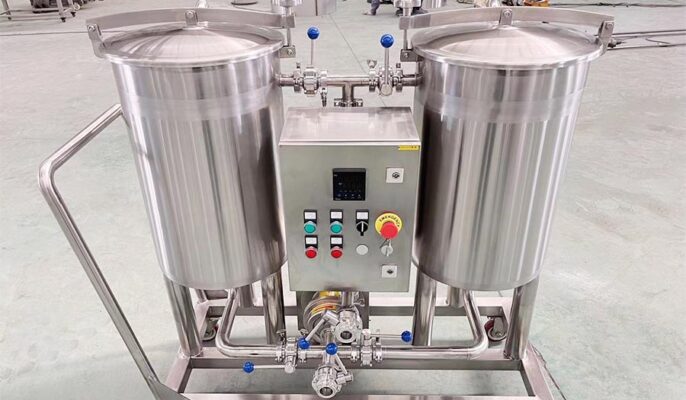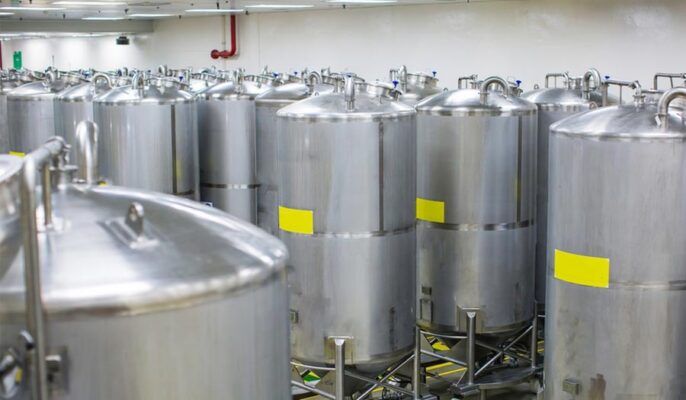Systém CIP je kombinací mechanických součástí a zařízení, které slouží ke kombinaci vody, chemikálií a tepla za účelem vytvoření čisticího roztoku. Tyto chemické čisticí roztoky jsou systémem CIP čerpány nebo cirkulují přes jiné systémy nebo zařízení, aby je vyčistily.
Pro ty, kteří neznají termín CIP, se jedná o čisticí systém, který pivovar používá k čištění nebo dezinfekci určitého technologického zařízení (například potrubí a nádrží) bez nutnosti . Mnoho otázek ohledně těchto systémů vzniká kvůli nesprávným informacím poskytovaným "out of box" poskytovateli CIP.
Pokud zvažujete investici do systém CIP pro vaše zařízení, je důležité zajistit, abyste získali spolehlivý a aktuální design. Váš tým pro návrh procesu by měl zohlednit potřeby vašeho provozu.
Jaký typ výrobku chci čistit?
To je důležité pochopit, protože různé aplikace potřebují různé úrovně TACT. Různé typy potravin a chemických nečistot představují jedinečné výzvy pro čištění.
- Čas T
- Akce
- Koncentrace C
- T-teplota
Lehké čištění
Zemina se rozpouští a nepřiléhá ke stěnám nádrží a potrubí. Většinu nečistot lze často odstranit důkladným předoplachem. Zbývající nečistoty se rozpustí alkalickým mytím. Jsou zapotřebí nižší teploty a méně chemikálií, protože povaha zeminy z výrobku umožňuje působení kapaliny odstranit a odnést většinu zeminy a jediný cyklus žíravého mytí vykoná svou práci. Ve většině případů postačí systém s jednou nebo dvěma nádržemi.
Středně těžké až těžké čištění
Výrobky s nižší rozpustností vyžadují silnější koncentrace čisticích prostředků a vyšší teploty, aby se odstranila nečistota.

Spolupracovali jste se svým dodavatelem chemikálií a určili jste chemické látky, dobu expozice a teplotu?
Dobrý dodavatel chemikálií dokáže analyzovat vodu a půdu vašich rostlin a vybrat chemikálii, která zajistí nejrychlejší a nejúčinnější reakci k jejich rozkladu. Často může doporučit dobu potřebnou k dokončení reakce (kontaktní dobu) a optimální teplotu, která napomůže rozkladu v půdě.
Jsou vaše nádrže navrženy pro čištění CIP?
Nádrže vyrobené staršími postupy často nejsou vhodné pro čištění rozprašovacími koulemi. U některých těchto systémů lze do nádrže přidat porty, které budou fungovat . Stejně jako u většiny nádrží však při přidání stříkacích koulí do starších nádrží, které nejsou vhodné pro čištění na místě, často vznikají problémy s únikem roztoku.
Lze eliminovat mrtvé prostory?
Čisticí roztok musí být schopen propláchnout všechny trubky určené k čištění. Pokud může přípravek smáčet povrch a nelze jej opláchnout, není vyčištěn .
Má vaše výrobní linka správný sklon, který zajišťuje dostatečný odtok vody?
Voda, která zůstává v potrubí mezi jednotlivými kroky čištění, může způsobit přenos a snížit účinnost čištění. Stojící voda v systému se stává místem, kde se během odstávky mohou začít množit bakterie.
Jak často je nutné čištění na místě?
Cykly CIP se provádějí po zpracování, při kterém dochází k běžnému znečištění, nebo při přechodu zpracovatelské linky z jednoho produktu na jiný. Četnost musí být dostatečná, aby byla zajištěna bezpečnost a kvalita výrobku, nezapomeňte, že příliš časté provádění čisticích cyklů může znamenat ztrátu cenného času a zdrojů.
Jaké funkce může systém CIP plnit?
vybavené systémy CIP lze použít k provádění různých úkolů, včetně čištění nádrží, potrubí a zařízení. Zákazníci, kteří chtějí integrovat systém CIP do svého zařízení, jej mohou použít pouze k jedné z těchto úloh nebo ke všem třem.
Čistí se nádrže na vodu obvykle za tepla nebo za studena?
Nádrže se obvykle čistí při okolní teplotě, ale v některých situacích může být nutná vyšší teplota. V těchto případech se udržování konstantní teploty během čisticího cyklu a regulace teploty během procesu chlazení stává kritickým a vyžaduje více programování pro ochranu zařízení.
Je nádrž při čištění pod tlakem?
Záleží na zařízení a procesu. Někteří zákazníci dávají přednost tomu, aby byla nádrž během čištění natlakována oxidem uhličitým. Tyto situace jsou omezené, musí se používat specializované chemikálie a je třeba věnovat zvýšenou pozornost bezpečnosti. Zákazníci, kteří se rozhodnou během procesu čištění nádrže netlakovat, však budou muset mít zavedeny postupy pro opětovné natlakování nádrže v případě zjištění možné absorpce vzduchu.

Proč je čištění zařízení tak náročné?
Čištění zařízení může být jedním z nejsložitějších úkolů a často vyžaduje největší přizpůsobení. Zařízení má často jedinečné požadavky, které vyžadují zvláštní pozornost při přípravě CIP. Ať už se jedná o speciální programování, handshaking mezi systémy nebo potvrzování kroků v HMI během cyklu, společnost Micet může pomoci optimalizovat řešení.
Má čištění zbytků nějaký vliv?
vliv. Tyto informace určují, jaký typ (nebo typy) čisticího prostředku nebo čisticího roztoku je třeba použít. Některé organické materiály musí být čištěny alkalickým čisticím prostředkem, zatímco jiné neorganické materiály mohou vyžadovat čištění kyselinou. Některé systémy mohou dokonce vyžadovat kombinaci obojího. Pro optimální výkon je třeba věnovat pozornost koncentraci a teplotě čisticího roztoku.
Jaké nástroje jsou nutné pro provoz systému CIP?
Obecně lze říci, že funkční systém CIP vyžaduje zdroj vody, zdroj chemikálií, zpětné vedení páry a kondenzátu (pro ohřev) a odtoky (gravitační i elektrické). Každý z těchto faktorů hraje důležitou roli při určování velikosti a celkového počtu potřebných skladovacích nádrží a velikosti potřebného potrubí.
Může systém CIP zaručit čištění v rozsahu 360° bez slepých uliček?
Při čištění musí být čisticí kapalina schopna zcela propláchnout všechna potrubí a zařízení. Pokud nelze zařízení pivovaru propláchnout, může v zařízení zůstat část čisticí kapaliny, což může ovlivnit další varné operace.
Systémy Clean-in-place jsou základním vybavením mnoha zpracovatelských zařízení. Pokud vaše společnost potřebuje systém CIP, můžete se obrátit na techniky společnosti micet. Poskytujeme komplexní řešení zařízení včetně návrhu, výroby, instalace a technické podpory, abychom vám zajistili systém CIP, který potřebujete pro vaše sanitární procesní aplikace.




